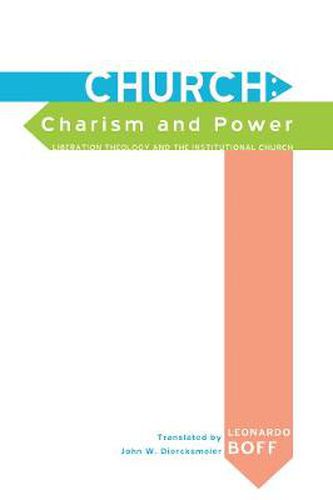Readings Newsletter
Become a Readings Member to make your shopping experience even easier.
Sign in or sign up for free!
You’re not far away from qualifying for FREE standard shipping within Australia
You’ve qualified for FREE standard shipping within Australia
The cart is loading…






This title is printed to order. This book may have been self-published. If so, we cannot guarantee the quality of the content. In the main most books will have gone through the editing process however some may not. We therefore suggest that you be aware of this before ordering this book. If in doubt check either the author or publisher’s details as we are unable to accept any returns unless they are faulty. Please contact us if you have any questions.
Why the furor over this book? Why was Church: Charism and Power the subject of a Vatican inquiry? The reason, ironically enough, has little to do with its alleged use of Marxist thought, but rather with its critical understanding of the church in the light of the gospel. Church: Charism and Power is a provocative, devastating critique of the ways in which power, sacred power, is controlled and exercised in the Roman Catholic Church. It is a militant book, a radical book, but it is by no means defective in orthodoxy. In fact, with all its criticism it offers a brilliant defense of the historical claims of Roman Catholicism. Its central thesis argues that since the fourth century the church has fallen victim to a kind of power that has nothing to do with the gospel and everything to do with the dynamics of power with all of its inevitable abuses. This historical reality, enshrined in the monarchical model of the church, was undermined at the Second Vatican Council and replaced by that of the church as people of God. This ‘laical’ model is closely allied in Boff’s exposition with the notion of the church as sacrament of the Holy Spirit: the church as sign and instrument of the now living and risen Christ, that is the Holy Spirit. A pneumatic ecclesiology such as this would lead the church back to its primitive dynamics of community, cooperation, and charism. It would create a church in which everyone shared equally and where flexible and appropriate ministries conformed to needs as they arose. Is such a church possible? Is it not simply the utopian dream of idealists and sectarians down through the ages? No, says Father Boff, given the incredible growth throughout Latin America of comunidades eclesiales de base, base communities, where the people express and achieve their desire for participation and where the hierarchy divests itself of its titles and ecclesiastical baggage, creating a common desire for community and equality. This model of the church has acquired an unexpected historical possibility: the new church is in the process of being born. This church, the church being born from the faith of the poor, has rediscovered for itself–and for the church universal–the living presence of the dangerous memory of Jesus Christ.
$9.00 standard shipping within Australia
FREE standard shipping within Australia for orders over $100.00
Express & International shipping calculated at checkout
This title is printed to order. This book may have been self-published. If so, we cannot guarantee the quality of the content. In the main most books will have gone through the editing process however some may not. We therefore suggest that you be aware of this before ordering this book. If in doubt check either the author or publisher’s details as we are unable to accept any returns unless they are faulty. Please contact us if you have any questions.
Why the furor over this book? Why was Church: Charism and Power the subject of a Vatican inquiry? The reason, ironically enough, has little to do with its alleged use of Marxist thought, but rather with its critical understanding of the church in the light of the gospel. Church: Charism and Power is a provocative, devastating critique of the ways in which power, sacred power, is controlled and exercised in the Roman Catholic Church. It is a militant book, a radical book, but it is by no means defective in orthodoxy. In fact, with all its criticism it offers a brilliant defense of the historical claims of Roman Catholicism. Its central thesis argues that since the fourth century the church has fallen victim to a kind of power that has nothing to do with the gospel and everything to do with the dynamics of power with all of its inevitable abuses. This historical reality, enshrined in the monarchical model of the church, was undermined at the Second Vatican Council and replaced by that of the church as people of God. This ‘laical’ model is closely allied in Boff’s exposition with the notion of the church as sacrament of the Holy Spirit: the church as sign and instrument of the now living and risen Christ, that is the Holy Spirit. A pneumatic ecclesiology such as this would lead the church back to its primitive dynamics of community, cooperation, and charism. It would create a church in which everyone shared equally and where flexible and appropriate ministries conformed to needs as they arose. Is such a church possible? Is it not simply the utopian dream of idealists and sectarians down through the ages? No, says Father Boff, given the incredible growth throughout Latin America of comunidades eclesiales de base, base communities, where the people express and achieve their desire for participation and where the hierarchy divests itself of its titles and ecclesiastical baggage, creating a common desire for community and equality. This model of the church has acquired an unexpected historical possibility: the new church is in the process of being born. This church, the church being born from the faith of the poor, has rediscovered for itself–and for the church universal–the living presence of the dangerous memory of Jesus Christ.